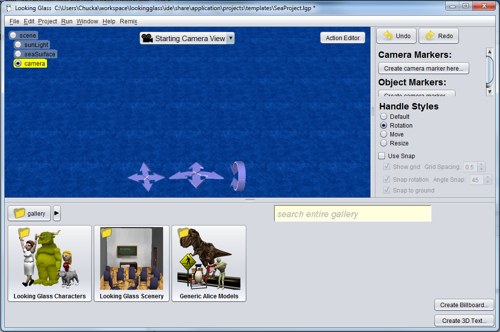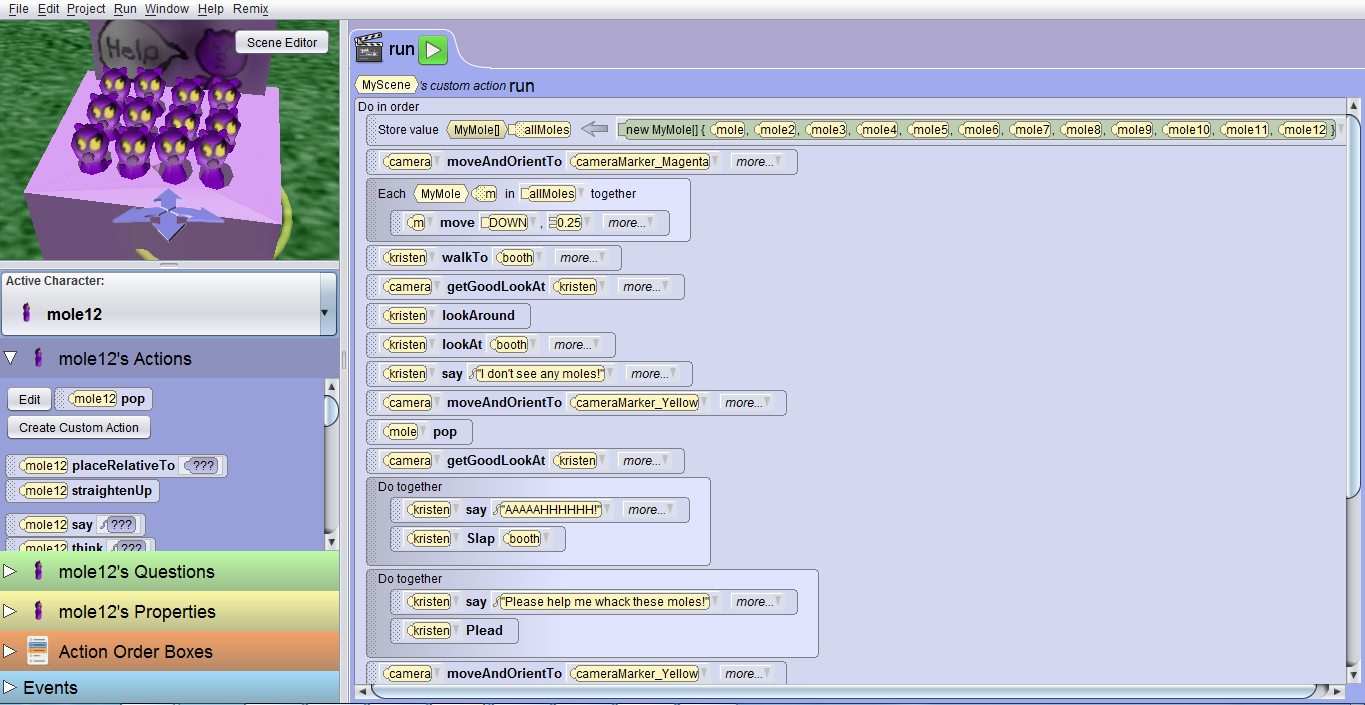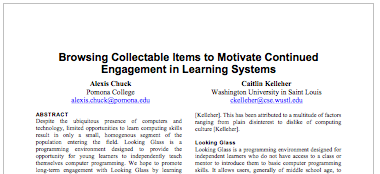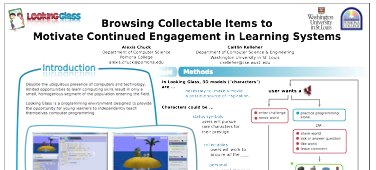A Crash Course in Looking Glass
For the best introduction to Looking Glass, the website is probably your best bet. There are introductory videos and tutorials; you can also download the program and play around with it!
Here are some essential specifics about the program and my project that might help make sense of this journal ...
 |
 |
Scene Editor |
Action Editor |
There are two major modes inside the Looking Glass IDE - the scene editor and the action editor. When you launch the program the action editor is visible. Your movie is visible in the top left-hand corner, but most of the window is taken up by your code. It is the mode where the user is actually programming. In contrast, the scene editor is all about adding and arranging environments, props, and characters. We've fallen into the habit of referring to all of these things you can add as "characters" - so when I use "characters" in this journal it could probably mean anything from a woman to a dragon to a potted plant. From either mode the user can play their movie.
Programming takes the form of dragging and dropping. For example, if you have added a character named "Suzy" to the scene via the scene editor, a menu of Suzy's possible actions appears in the action editor. One of these actions might be "say '???'". You can drag the "Suzy say '???'" action into your code. Once it is there, you can use drop down menus to change "Suzy" to any other character existing in your scene that has the "say '???'" action. You can also, of course, change '???' to any text you want.
About the Project
This summer, the focus for the undergraduate researchers was developing the infastructure for an online community to support the independing learners using Looking Glass, with the idea of using the resources generated by this community to 1) provide personalized, tutor-like guidance and help and 2) motivate users to continue expanding their programming knowledge.
Characters are the basic unit of the rewards system we devised. You can get them by entering a challenge or remixing a world. Ignore remixing for now, we all do. Challenges are created on the website by either users or groups. If you win a challenge you win either a specific character or a character credit (which entitles you to pick 1 character out of a set of n choices). Mark and Terian have been working extensively on how exactly this all goes down. All summer they worked on designing and devloping the website.
Michelle and I are working on designing (and, later, implementing) the intersection between IDE and website. Our projects originally existed in a so-called community panel. Michelle is working on helping (asking questions, looking at answered question, answering questions, etc.) and sharing (uploading a world to the website). At the beginning of the summer I was working on the scrapbook (some way to browse/store interesting/saved characters, challenges, worlds, and more) and the character gallery (finding and acquiring new characters).
My project morphed over the course of the summer. The scrapbook turned into a general vehicle for transporting "scraps" between the website and the IDE. But since this didn't really make sense in a reality in which the website does not exist yet, it didn't happen. The character gallery similarly made little sense without actual new characters to work with. I implemented a new way of browsing characters that both works with the current, un-tagged characters, and can one day include and display new ones.
About the People
There are four graduate students in the lab this summer as well as six REU students, including myself. A list of people in the lab can be found here. Kyle and Paul are both pursuing their PhDs and are both working on projects related to Looking Glass. Sara is just beginning her graduate studies here and is just as new to the project as us undergrads - with the exception of Micah, a Wash U undergrad who has worked in this lab for awhile now. The rest of us undergraduates are from out of town. Terian is from Grinnell College; Mark is from Amherst College; and Michelle is from Tufts University. Michelle is also a DREU participant.
Gazi, the fourth graduate student, and Kevin, an REU student from Wash U are both working on the hearing games for strokey therapy project.
Final Report
Here are PDFs of the final paper and poster I wrote for my research this summer. Fun fact: I will present the poster at the 2011 Grace Hopper Celebration of Women in Computing in Portland, OR.
 |
 |
Final Paper. |
Final Poster. Warning: This is a massive 32" x 42" file. |